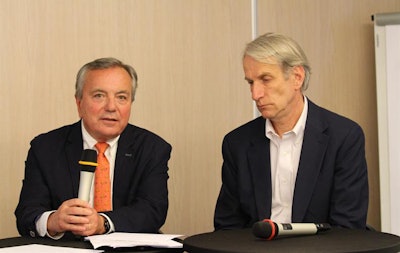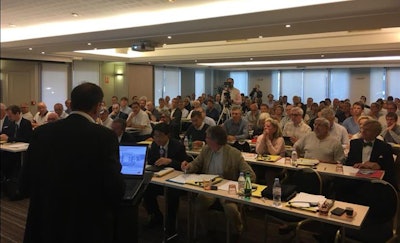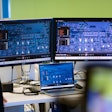
France's national professional council, G4, has launched a novel collaboration with other partners to develop a complete artificial intelligence (AI) tool for medical imaging. The project's committee has urged industry to participate in the "AI imaging ecosystem" scheme.
The announcement came after a daylong conference organized by the national union of private radiologists (Fédération Nationale des Médecins Radiologues, FNMR) on 2 June in Lyon, called "Artificial Intelligence: the radiologist's dream or nightmare?" Experts from different disciplines as well as civil representatives and leaders from the fields of politics, law, and philosophy provided the latest thinking about the direction of AI.
 Dr. Jean-Philippe Masson (left) and Prof. Jean-François Meder at Saturday's launch event. All images courtesy of FNMR.
Dr. Jean-Philippe Masson (left) and Prof. Jean-François Meder at Saturday's launch event. All images courtesy of FNMR.Dr. Jean-Philippe Masson, president of FNMR, and Prof. Jean-François Meder, president of the national radiology society (Société Française de Radiologie, SFR), made the joint announcement on behalf of the G4 on Saturday evening in a livestream on the internet in which they highlighted how the technology will impact imaging services.
"We are aiming to develop a complete and highly accessible AI tool that can be applied to the full range of diagnostic imaging exams across the entire body -- unlike the organ- or system-specific fledgling AI tools currently available in mammography or colonoscopy," Masson told AuntMinnieEurope.com. "The project is highly ambitious and probably came as a great surprise to many parties present at the seminar, who probably didn't realize that imaging has such an enormous database at its disposal. We are expecting a lot of interest from potential partners."
Vital independence
The project will put a French touch on the burgeoning field of AI, and it will take advantage of the massive number of imaging studies that have been archived in French radiology facilities.
"Thanks to the big data of more than 500 million radiological medical files archived by radiologists in French imaging services over the past five years, this tool will provide patients with new technology, key to medical progress," Meder and Masson noted.
The project will represent a medical and technical challenge in terms of integrating all of the data and will need to respect ethical and legislative rules, they added. It will also ensure the independence, culture, and humanitarian vision of French radiology, so that this breakthrough technology always puts patients at the center of France's health system.
The project's organizers noted that the venture is in line with France's national digital development plan, and they are confident that it will be supported by government.
 Attendees at the AI meeting in Lyon.
Attendees at the AI meeting in Lyon.Speakers at Saturday's AI conference included Dr. Paul Chang, from the department of radiology at the University of Chicago, as well as representatives from universities, medical and ethical societies, and five industry giants. Themes included whether or not AI's efficacy will impose heteronomy on the human population, ethics in AI development, and AI in international relations, along with more specific radiological subjects such as AI's effect on the patient-doctor relationship, image analysis and simulation, and how to prepare for AI as a resident radiologist.
FNMR will broadcast the presentations on the internet as webinars over the coming weeks and months, according to Masson, with English translations available for some topics.



















